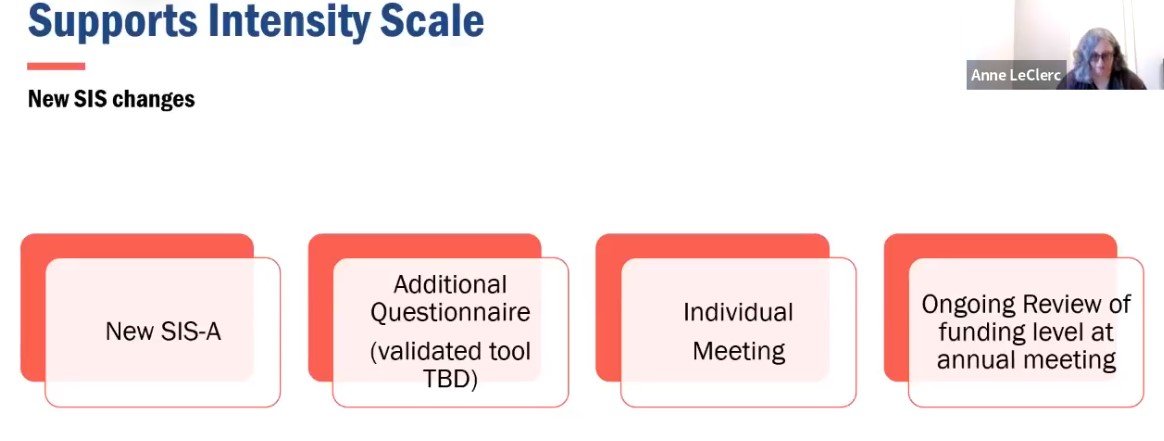Consent Decree Drives Proposed Hike In RI DD Spending
/By Gina Macris
Rhode Island Governor Dan McKee would add more than $30 million to developmental disabilities spending to raise starting pay for direct care workers to $20 an hour, hike dozens of reimbursement rates to private service providers, and add ten new staff to help implement a 2014 consent decree.
The pay increase, costing $29.9 million in federal-state Medicaid funding, would be the third annual hike intended to help private agencies and the so-called “self-directed” population managing their own service programs. The wage increase would comply with a federal court order that dates back two years.
In 2021, when the starting wage for direct care workers was $13.18 an hour, Chief Judge John J. McConnell, Jr. ordered the state to raise wages to $20 an hour by 2024, calling a lack of staff the single biggest barrier to implementing the day-to-day requirements of the consent decree, albeit not the only one.
In 2022, with pay raised to $15.75 an hour, the Rhode Island system added 106 new direct care workers from January through June.
On July 1, 2022, the starting pay increased again to $18 an hour, and the state, prodded by the court, launched a workforce initiative to recruit candidates for direct care jobs. In September alone, the system filled 146 vacancies, according to data collected by an independent court monitor.
Yet there were still 693 vacancies in some three dozen private agencies and as many as 1,000 job openings among self-directed consumers and families, the monitor reported in early November.
overview of proposed DD spending - RI Department of Administration
In all, McKee seeks a total of nearly $417.4 million for all developmental disability services in the fiscal year beginning July 1, including slightly more than $385 million for the privately-run system, the backbone of consent decree compliance. That figure for private agency and self-directed services represents a bump of about $32.2 million over the current allocation of about $352.9 million.
A parallel network of state-run group homes would get $32.4 million in the next budget, or almost $1.8 million more than the current funding level of $30.8 million.
The budget for the next fiscal year, July 1,2023-June 30, 2024, will finance the state’s final push to comply with the consent decree before the deadline on June 30, 2024.
The state agreed in 2014 that by mid-2024, it would eliminate sheltered workshops paying sub-minimum wages and move away from isolated day care centers. Instead, there would be a de-centralized network of individualized services enabling adults with developmental disabilities to become integrated in their communities.
The Department of Justice (DOJ) has said that Rhode Island will likely miss the 2024 deadline if it moves at the current pace. The DOJ cited numerous factors contributing to a lack of services, particularly the individualized services in the community that are the cornerstone of the consent decree. A far-reaching federal court order issued Dec. 6 lists some 50 requirements that must be completed by the deadline on June 30, 2024.
McKee wants the new consent decree implementation staff on board as early as possible.
A spokesman for the state Department of Behavioral Healthcare, Developmental Disabilities and Hospitals (BHDDH) said the department hopes to complete the hiring process by the fourth quarter, which runs from April through June. The cost for these added workers would be $203,275 for the first full year, taking into account federal Medicaid reimbursements and savings from staff turnover in other positions, according to McKee’s executive summary of the spending plan.
Eight of the ten positions will be permanently added to the Division of Developmental Disabilities (DDD), the BHDDH spokesman said.
The DDD jobs include:
an “interdepartmental project manager”
a “chief of staff for development training and continuous quality improvement”
·an “associate administrator for community services”
five positions promoting community development as it relates to adults with developmental disabilities
The salaries will range from $66,162 to $95,552 a year, the BHDDH spokesman said.
Two other employees not attached to BHDDH will help implement an outside consultant’s recommendations for reimbursement rates for private providers.
Undertaking a rate review itself was part of a court order issued in October, 2021. Consultants disclosed preliminary recommendations last September that called for increases ranging from about 25 percent to 97 percent in dozens of reimbursement categories to private providers.
But McKee said in an executive summary of the budget that the consultant’s report is “currently under review and may further increase the recommended amount of financing” allocated to the private developmental disabilities system.
Among other actions, the Dec. 6 court order requires the state to identify successful pilot programs promoting integration that have been developed by private service providers during the past year and make those programs available to all those who want them, regardless of the way consultants have structured reimbursements to the private sector.
The consent decree has brought more transparency to budgeting by generating pressure on the General Assembly to include adults with developmental disabilities in the biannual caseload estimating conference, a public process used to project the state’s obligations for public assistance, like food stamps. Developmental disability costs were added in 2021.
The most recent caseload estimating conference, in November, projected there will be $8.5 million less in reimbursements to private service providers than budgeted for the current fiscal year because the population is expected to use fewer support services than initially budgeted.
McKee’s proposal takes the caseload estimating conference projections into account, as well as other related costs, in reducing developmental disabilities services by about $4.4 million, from about $352.9 million to about $348.5 million, in the current fiscal year.
The caseload estimating conference also highlighted the fact that consumers and families often must appeal individual budget allocations to get needed services – a feature of the current reimbursement system which the federal court has cited as a weakness.
Projections for the current fiscal year include $22.8 million in successful appeals, or $5.8 million more than budgeted. An independent court monitor has said consumers should not have to make lengthy appeals to get the individualized services to which they are entitled.
The consent decree draws its authority from the Supreme Court’s Olmstead decision, re-affirmed the Integration Mandate of the Americans With Disabilities Act, requiring public services for all persons with disabilities to help them lead regular lives in the their communities.
Developmental disabilities funding makes up about two thirds of the overall BHDDH budget, which is currently funded at about $597.1 million. McKee would raise the BHDDH total to about $619.6 million in the next fiscal year, with more than half the revenue coming from federal Medicaid reimbursements.







